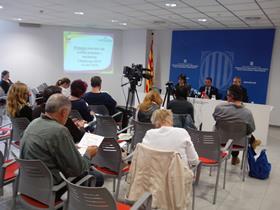
Catalonia is set for a modest increase in stonefruit production this year. The preliminary forecasts from Afrucat peg the 2015 crop at 425,060 tonnes, a 3 per cent rise on last year’s total.
The association said overall quality is expected to be good, with an abundance of larger sizes due to the heavy pruning undertaken by some producers. However, a question mark hangs of the impact of the frosts which struck Lleida on 9 April, a more accurate assessment of which will be made at the end of the month when trees are thinned out.
This year’s volume growth is mainly due to an increase in production in Lleida, where output is forecast to rise by 4 per cent to 380,100 tonnes, and Tarragona (+2 per cent to 36,000 tonnes). Production in Girona and Barcelona, meanwhile, are expected to fall by 22 per cent and 2 per cent respectively.
Afrucat noted that with harvesting expected to start some five to seven days later than in 2014 there should be no overlap with other production zones in Spain.
While the rate of new plantings in Catalonia has slowed somewhat, producers continue to replace low quality varieties with newer, higher yielding ones. Production of flat peaches will exceed round peaches for the first time, making up 27 per cent of the total peach and nectarine volume for Catalonia, Afrucat said. The association’s manager Manel Simon claimed the industry’s growing specialisation in flat peaches means it is well positioned in the market as it is the only production region in Europe able to supply the variety in high volumes.
Meanwhile, following previous wide-scale uprooting, production of clingstone peaches is expected to stabilise thanks to the variety’s success in recent seasons.
In spite of the Russian ban, Catalonia’s stonefruit exports grew by 1 per cent in 2014, reaching a new record for the region. The fall in shipments to Russia was offset by increases in other traditional markets such as Germany, the UK, Italy, Brazil, North Africa and eastern Europe.
Afrucat welcomed this year’s production increase, pointing out that it would compensate for the fall in output in Italy, a country whose stonefruit industry is experiencing a similar decline to that seen previously in France.



